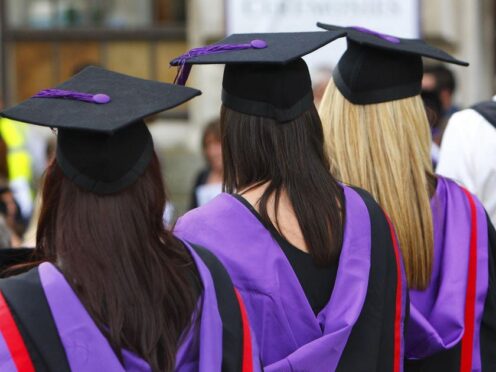
More than 40% of graduates who were the first in their family to attend university said they could not have afforded to go without financial support, a survey has found.
Universities UK (UUK) said the figure of 41% was equivalent to around 1.1 million 24 to 40-year-olds in England and Wales.
A further 14% of the same group said that without financial assistance they would have gone to a different university to be closer to home, or lived with their family to save money, according to the survey by UUK.
When asked what they thought may stop people they know from attending university, 63% of the same group highlighted rising cost-of-living expenses, 59% mentioned rental accommodation, and rising inflation was referred to by 53%.
UUK, which represents 142 universities, said it was calling for the Government to reinstate maintenance grants in England and increase support for future students.
The organisation’s chief executive said there needed to be an improvement in maintenance support to help “those from the least privileged backgrounds”.
A survey by UUK of non-graduates revealed that over a third were put off university by concerns about their financial commitments.
When asked what might have persuaded them to attend university, almost half responded with more financial support.
A Department for Education spokesperson said: “We know students have continued to face financial challenges, which is why we are increasing loans and grants for living and other costs along with freezing tuition fees for another year.
“We are also providing an additional £10 million to the Office for Students to help students who are struggling financially or with their mental health – plus £276 million that universities can draw on for hardship support.”
The survey by UUK found that nearly three quarters of “first-in-the-family” graduates said attending university had helped them get over any sense of imposter syndrome.
This is despite 65% saying that imposter syndrome had made them think twice about attending higher education at all.
Vivienne Stern, chief executive of UUK, said she disagreed with “those who say that too many people go to university”.
Ms Stern added: “I am amazed by how many graduates talked about having imposter syndrome – and the way that earning a degree helped to banish that feeling.
“I believe we have a responsibility to keep working to ensure a wider range of people in this country get access to the potentially transformative experience of going to university.
“For that to happen, we really do need to see an improvement in maintenance support to support those from the least privileged backgrounds.”
England and Arsenal footballer Beth Mead was the first in her family to attend university and said her time studying at Teesside University was a “fantastic experience”.
Ms Mead, an ambassador for UUK’s campaign championing first-in-the-family graduates, added: “I thoroughly enjoyed my time at Teesside University and the support I received from the university at the start of my career was invaluable.”
Nobel Prize for Economics winner Professor Sir Chris Pissarides, who also supports the UUK campaign, said: “We are driven by curiosity, progression, and the desire to have a good life.
“There is no better stepping stone to such achievements than your first university.
“I cannot even imagine where I would be without mine.”
UUK commissioned two surveys involving 6,004 graduates and 4,006 non-graduates from across the UK.

Enjoy the convenience of having The Sunday Post delivered as a digital ePaper straight to your smartphone, tablet or computer.
Subscribe for only £5.49 a month and enjoy all the benefits of the printed paper as a digital replica.
Subscribe